|
|
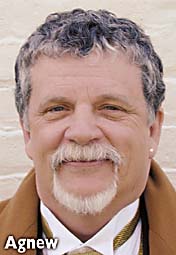 Joel Agnew Joel AgnewTHE CANDIDATE: Joel Agnew turns 55 on election day. He created and starred in a two-minute Fox-TV program called "What's Going On." He is currently an ad salesman for Fox-TV in Eureka. He is an actor and just finished directing "Lost in Yonkers" at the North Coast Repertory Theater. He sits on the group's board of directors. ISSUES/VISION: Agnew would like to have a city government that is responsive to the public. He also wants to see the city invest in the local arts community. He would like to bring an August arts festival to Eureka that could include things like a Taste of Main Street. FINANCIAL CONTRIBUTIONS: Agnew has raised $2,446, as of Oct. 7. He has contributed $1,700 to his own campaign. He has spent $2,159. NOTABLE QUOTES: "I am as concerned about the progress and economic prosperity of the North Coast as Cherie Arkley; I am as smart as Peter LaVallee; I'm as flamboyant as T. Great Razooly; and as cantankerous as Jack McKellar -- something for everybody." |
Agnew may be the most familiar face to voters. For five years he starred on "What's Going On," the daily two-minute Fox-TV program showcasing entertainment events happening around Humboldt County.
When Agnew decided to seek public office he stopped appearing on TV. It was a difficult decision for him to make, but the right decision nonetheless, he said.
Agnew first thought of running for the 5th Ward council seat but opted instead to run for mayor.
"The fact is I always thought I should run for mayor, but I was told by my boss not to run because it would be too much of a conflict with my job," he said.
Agnew sells commercial time for Fox-TV in Eureka. His employer felt that if Agnew were elected to the City Council, his voting could affect some of the businesses he works with. But Agnew decided that if he was going to get in any trouble running for office, he may as well get into trouble running for mayor.
Agnew, who recently finished directing "Lost In Yonkers" at the North Coast Repertory Theater in Eureka, said he believes the arts can be developed to the point of becoming a revenue source for the city.
"We need to invest in our arts community," he said. "The last natural resource on the North Coast are the artists of Humboldt County."
One idea would be to financially assist theaters in town, to help them get on their feet. That would in turn help theaters become financially stable.
"We have to put a value on what we have to offer," Agnew said.
He believes his background in the arts will enable him to be a good mayor.
"The job is to work well with the media and to promote the city here and abroad," Agnew said. "I have an understanding of the arts, promotions, advertising and creative ways to use small amounts of money to create an impact."
Although he has never held public office, Agnew said he knows he can handle the job of mayor.
"The job of mayor is to inspire. I call it being a dreamer, a visionary," he said. "I've got the right attitude, the right skills, but it is up to the voters."
Even though Agnew's emphasis is on the arts, he does recognize there are other issues affecting Eureka, such as the annexation of Cutten and Myrtletown into the city limits. He also believes people need to be heard.
"When there is a passionate issue before the council there has to be avenues for people to be understood," he said.
Agnew says there is an inequity with the utility tax. Although a $1,000 cap is in place for the largest users, people in the low-income bracket may need some relief, too.
"Maybe (Eureka) needs to raise the cap to $2,000 and find some way to give relief to people just above the poverty level so they can remain off of assistance," he said. "We can work toward what is fair."
|
THE CANDIDATE: Cherie Arkley, 46, is a City Council member, finishing up her first term. When Mayor Nancy Flemming is absent, Arkley fills in as mayor pro tem. She is a registered nurse and with her husband, Rob, owns Security National Servicing, Inc., a national loan servicing corporation in Eureka, employing 125 people. There are branch offices in five other cities. |
If Agnew is the most recognizable face, Councilmember Cherie Arkley has the most recognizable name. Her signs greet motorists as they head south through Eureka, through Old Town and through many of the downtown neighborhoods. She and her husband Rob, one of the wealthiest couples in the county, are well known local philanthropists. In the last few years they have donated to many public and private projects, including $2 million to the city of Eureka's boardwalk project and a similar amount to the Sequoia Zoo.
Arkley believes she is the best choice of the seven candidates for mayor, in part because of her four years on the council and because she and her husband own Security National Servicing, Inc., a national loan servicing corporation headquartered in downtown Eureka, where they employ 125 people.
"I think having a mayor who knows both city hall and private business in the same town is a really good mayor to have," she said.
Arkley believes Eureka is at a fork in the road; either the city moves forward and continues to evolve and develop or it could slide backwards. Progress for Eureka, she added, will best be achieved through developing businesses.
"I see the city as the body and the heart is business, and a beating heart and a strong heart (means) you have a healthy person," she said. "If you strengthen business and support business downtown, which also means Old Town, the sunlight will spread. It's a win-win for the city."
Arkley's pro-business stand has also led her to speak out against a proposed big box ordinance that she sees as protectionist.
If she is elected mayor, she won't be able to vote on the ordinance -- or anything else for that matter -- unless there's a tie. But she's willing to exchange the power of a city council member for the leadership role of mayor.
"I remain unconvinced that we need this ordinance at all," she said. Arkley sees two problems with it. First, most of what is contained in the ordinance is already covered under the California Environmental Quality Act. Second, she is opposed to the requirement that a big retailer file an economic impact report as part of a larger evaluation of the store's potential effects. "The economic impact report is very disturbing to me, that's code for protectionism," she said. "I am an advocate of the free market. I truly don't believe that families and businesses of the North Coast want protectionism, they want opportunity and choice."
Government needs to stay out of these things, Arkley added.
And contrary to what many people feel about stores like Wal-Mart, Target or Home Depot, Arkley doesn't believe large retailers will hurt smaller businesses.
"A lot of these [local] businesses have niches. You are not going to kill off a Los Bagels, you are not going to kill off The Irish Shop, you are not going to kill off a Restoration Hardware, they are our bread and butter," she said. "I just hate to put more restrictions on people here. It's incredibly elitist to protect."
Some voters assume Arkley will win because of the amount of money at her disposal. She is spending $54,348, almost six times more than any other candidate.
"Yes I will probably outspend my opponents, but I think I am also the better candidate, and I think I have the most experience, the most commitment, the track record," she said.
Arkley isn't limiting herself to promoting businesses. She also believes the city needs to seriously consider annexing Cutten and Myrtletown and even Elk River and Humboldt Hills. And she acknowledges the city will have to look at sources of additional revenue, possibly through sales tax growth.
"It's an unpopular thing to say, but we have to raise money" to fund city services, Arkley said.
|
THE CANDIDATE: Peter LaVallee, 53, is the director of the Youth Service division of the Redwood Community Action Agency. For five years he was the head of youth services in Trinity County. |
Peter LaVallee believes the next mayor needs leadership skills and needs to know how to work with civic groups, run productive meetings and get more Eurekans involved in their city.
"There is room for improvement over the performance [of] the past dozen years," he said.
Because of the mayor's limited role, LaVallee said he has been struggling with how best to present issues. On the one hand, the charter makes clear that the mayor merely presides over the council meetings and only votes in case of a tie. But LaVallee doesn't buy that the mayor is a figurehead, as some in the election have implied.
"A figurehead doesn't really add that much to the city. What we need is leadership," he said. "That's the central theme for the mayor's race, what kind of person can make this city government tick."
LaVallee said he has heard complaints from residents that the city government has been somewhat of a closed system, that residents don't feel invited to participate. Many residents complain that special interests, cozy with the mayor, have an easier time getting their issues brought before the council, he added.
"You need to make people feel welcomed. You don't have to agree with them. That's not the role. The role is to provide an open forum for the community to get its issues before its public servants," LaVallee said.
Residents have expressed concerns that other areas of Eureka need to be given as much attention as Old Town.
"It's a valid argument. We need to refocus energy and focus on other areas of the city," he said.
One idea LaVallee has suggested would be to hold council meetings in each of the five wards, once a year.
"Even if only 10 people show up, it's 10 people that might not have shown up at a council meeting because it is closer to their home," he said.
He also believes the city should hold a primary election for mayor and city council seats. The current process, which allows seven candidates to get on the ballot, isn't a good process because it places too many names on the ballot, he added.
LaVallee supports the big box ordinance. He doesn't believe that opening the door to large retailers will help the city.
"We have to talk about long-term economic development, but in a context that is cognizant and sensitive to the community," he said. "We need zoning (laws) that make sense. That doesn't mean we can't have business here, but it needs to be planned."
LaVallee believes citizens deserve a process whereby everyone has an opportunity to come before the council with recommendations. That would allow the community a voice in how Eureka will develop.
Economic development has to be viewed on a regional basis too, LaVallee said. What happens in Eureka affects the entire county, he added.
LaVallee also supports the city's utility tax -- a three percent tax on cable television, gas, electric and phone service. The tax raises $1.1 million annually for the city's general fund. Because of dwindling state funds, cities have seen their general fund budgets shrink. At the same time residents expect a certain level of services from the city, LaVallee said.
"I agree with the [city] staff's position that [the utility tax] needs to pass or we will have some tough decisions to make," he said.
For those who oppose the tax, LaVallee has only one question: "What are you willing to give up if (Eureka) has $1.1 million less [to spend]?"
|
THE CANDIDATE: Mary Mahoney, 60, worked for the city of Eureka for 23 years in various departments. |
Mary Mahoney is running a simple campaign with a simple message: leave running the city to the people hired to do it, keep the mayor's job in line with the city charter, and have fun.
"I have maintained that the mayor's role is limited," Mahoney said. "The [mayor's role] is very simplified to me, it's an important role. You become a spokesman, an ambassador."
The mayor must also be a good listener, Mahoney said. She doesn't agree that the mayor should be traveling.
"I don't see that as a vital part of the job," Mahoney said.
Running the city is left to the City Council, city manager and department heads, Mahoney maintains.
"The ones running for City Council have a bigger burden to bear. They are the decision-makers," she said. "(The council) are the ones saying where the city is (headed)."
Mahoney has been repeatedly asked her stance on the issues, but she said she is not giving her opinion.
"It's not the mayor's role to influence. I don't want to put things out there that make it look like those are my priorities," Mahoney said. "I don't have an agenda. You need to know the issues, you can take action on them in case of a ties, but you have no administrative duties."
Mahoney said she isn't being naive. She knows there are things going on in the city. Even without putting forth any issues, Mahoney said it is still easy to campaign.
Mahoney has refused all donations, plans no fundraisers and is not taking out any advertisements. She believes no one should have to spend a lot of money to serve the community.
"People laugh at me. They ask, `what is your platform?' I don't have one," she said.
Even with a limited role, Mahoney believes the job of mayor would still be fulfilling.
"You'd be informed of what is going on and what is happening in the city you live in," she said. "To me the council is the top, the mayor is the figurehead above them. The council are the one deciding our future. They are the ones the public has to contact."
|
THE CANDIDATE: Jack McKellar, 80, has been on the Eureka City Council for 12 years. He worked 32 years for the U.S. Army Corps of Engineers and is a former Navy diver, logger and guide on the Klamath River. |
City Councilman Jack McKellar is often referred to as gruff, feisty and a curmudgeon. He isn't one to hold back on his thoughts. Now he wants to be mayor. He, too, believes the mayor has little power.
"We have to realize the mayor generates little movement one way or another in politics," he said.
McKellar is his own man. At council meetings he is unafraid to be the sole dissenting vote. He says he won't follow in the footsteps of Flemming. And he plans to stand back and let City Manager David Tyson do his job.
"The job of running the city is the city manager's job. I am going to promote that job. I won't stand in his way," McKellar said. "I don't even have the privilege of telling (Tyson) what to do or to do (something) better."
Although Mahoney and McKellar may share a similar view of the mayor's job, McKellar does see some issues on the horizon.
While other candidates talk of doing something with the Balloon Tract, land currently owned by Union Pacific, McKellar firmly believes the land should be used for some industrial purpose. But not before someone other than the city cleans it up.
The tract of land, once proposed as the site for a new Wal-Mart store, is polluted, McKellar says. That is the reason he voted against Wal-Mart.
"If Wal-Mart really wanted to come in (to Eureka) there were lots of other areas they could have gone in the city or county," McKellar said. "My whole move was to save people the liability. Some people held that against me."
To this day, McKellar believes he did the right thing.
"To saddle all the people in this community with that responsibility (of cleaning up the Balloon Tract) is not the right thing to do," he said.
McKellar also believes the time is right to annex areas outside of Eureka's city limits. He said Eureka is bursting at its seams.
"I always thought annexation should happen and now more than ever," he said.
Through annexation, Eureka's population could increase from 28,000 to 50,000. That would help the city's tax base, McKellar said. But he also realizes there are people in areas like Cutten and King Salmon who will oppose any plan to join the city.
"I'd be more than happy to sit there and be a sweet old man and watch it all," he said of any annexation process.
McKellar also recognizes the need for improving the small business atmosphere in Eureka. He believes that is the key to economic development. But he wouldn't make the city go it alone. McKellar said he would turn to others like Rep. Mike Thompson to help bring businesses to Eureka.
Humboldt Bay could also use a deeper harbor, McKellar said.
"The harbor we have is deep enough to handle mid-sized container ships," he said.
McKellar wants Humboldt Bay to become a major port. While there are some who say it can't be done without a railroad, McKellar believes a railroad may not be necessary. Trucks may be able to handle the freight, he said.
As for the big box ordinance, McKellar accused Councilman Chris Kerrigan of pushing it on behalf of "special interests," in particular environmentalists.
Perhaps McKellar's biggest desire would be to see Eureka return to its bygone days. McKellar recalls a few years ago having breakfast at 6:30 a.m. in Adel's Restaurant on Broadway. Back then he'd rarely see a car drive by. Today, all he sees is stop-and-go traffic.
"I would much rather have a small town without traffic," he said.
McKellar left Los Angeles for the North Coast more than 50 years ago because he saw what was happening to Los Angeles: more cars, more traffic and a decline in the quality of life. He is seeing the same thing happening in Eureka.
"I got tired of Los Angeles. What is happening here was happening down there (back) then," he said.
|
THE CANDIDATE: T. Great Razooly, 47, owns and operates the Tip Top Club. He ran for mayor in 1998 and received about 25 percent of the vote. |
T. Great Razooly is making his second run for mayor of Eureka. In 1998 he got approximately 25 percent of the vote. This year, in a field of seven candidates, 25 percent could be enough to win.
Razooly believes the "insiders club" has already picked the next mayor -- Cherie Arkley. He believes it is the "insiders club" that stymies a lot of Eureka's potential. For example, it is the "insiders club" that has kept a lot of people away from city hall, by making the atmosphere unfriendly toward residents.
"The people are the ones who get to go into the voting booth and pick the next mayor," Razooly said.
The way to beat the system is to go out and get people involved; register new voters and hear what people have to say.
"The people don't like the inside power structure," Razooly said.
Razooly sees himself as the candidate for the common people, the people with different and new ideas who have never before been involved.
"This is their time to have a voice and be involved," he said. "Do you want to vote for new people with new ideas, or do you want to go with the same old power structure that's been there?"
Razooly is full of ideas, ranging from building a water park and a world-class skateboard park to the possibility of bringing the film industry to Eureka.
"If we get these ideas going there will be plenty of jobs for everybody," Razooly said. "That's mandatory. Everybody has to have something to do."
In keeping with his Libertarian stand, he has come out against Measure X, the city's utility tax initiative. He is the only candidate to take a stand against the tax.
"The government should be much more careful with (the public's) money," he said.
There would also be a benefit to not having the utility tax; residents in the unincorporated areas around Eureka might be more willing to be annexed. But Razooly doesn't believe the city's sales and transient occupancy tax are out of line. It's the state and federal taxes that make it tough on people, he said.
"So we have to fight (taxes) wherever we can," Razooly said. "If we have an opportunity to eliminate a tax or lower a tax I am going to be leading the fight."
He also vows to lead the fight against drugs. If elected mayor he plans to take the lead in the fight against methamphetamine.
"I am going to get people who work with me and we are going to go and stand on the street in front of that (drug) house and we'll stop (drug sales)," he said. "If any dealing or any manufacturing of (meth) is going on within city limits, it will not go on when I am mayor."
While some voters might find Razooly's ideas refreshing, others still view him as the owner of a strip club who is making a mockery of the election. He doesn't shy away from the fact that he owns the Tip Top Club -- in fact, he ran for mayor four years ago in part because he was angered at the city for trying (unsuccessfully) to prevent him from opening the club. But he is adamant that he is a serious candidate.
"I am not worried about winning everybody over. Even the people I don't win over will have an important part (to play) in the city," Razooly said.
|
THE CANDIDATE: Marshall Spalding, 44, is the manager of the Courthouse Market on 5th Street. |
Marshall Spalding
Marshall Spalding sees himself as the people's candidate. As manager of the Courthouse Market on 5th Street, he said he feels the pulse of the people every day and he has learned that people are sick of the status quo in Eureka.
"I have empathy for all the people. I want to give them a better life," Spalding said. "I am the voice of the people trying to overthrow the system of the good-old-boy network in Eureka."
Spalding doesn't mince words. There is a system of collusion, nepotism, protectionism and price-fixing going on at city hall, he said. His campaign has been met with resistance because the establishment at city hall doesn't want to give up what they have.
"The rich people who have controlled the city of Eureka for over 100 years are going to fall," he said. "People are going to take control of their government. They are going to have their alleys paved, they are going to get Wal-Mart, they are going to have the parks open and the restrooms open seven days a week."
Spalding also believes that redeveloping Eureka should go beyond Old Town. The idea that only the parts of Eureka that draw tourists should be developed is wrong, he said.
"The city as a whole is ugly. Too much concentration is given to the Old Town area where the rich people have their businesses," he said. "There are 28,000 people who have needs and wants that need to be addressed outside of the tourists. Those needs are not being addressed."
Spalding equates what has been happening in Eureka with apartheid, the form of government that existed in South Africa to keep Africans and whites separated culturally, economically and politically.
But while Spalding wants to get the wealthy out of city government, he isn't anti-rich. He just believes that with rich people in charge they can control the masses, thus setting the city's agenda.
"The middle-class and the poor's needs won't be addressed because the rich have no clue of what the needs are for the middle-class and poor," he said.
Spalding would also like to see the city steer away from relying on consultants. He questions who gets the thousands spent on consultants every time the city does a feasibility study on some issue.
"Our taxpayers are paying hard earned money, but it's not being spent on them," he said. "The money is being given to special groups and that's the problem. There is a lot of money in Eureka, but that money is being directed toward special interest and not toward paving the streets and alleys, opening the parks or beautifying the (entire) city."
Spalding also believes that the mayor has more power than some in the campaign are willing to let on. The concept that the mayor is a figurehead is just a public relations campaign, a smoke-screen, by the rich to keep someone from getting into the government and satisfying the needs of the people, he added.
By throwing out entrenched elements at City Hall, Eureka will be able to bring in businesses like Wal-Mart and Home Depot that can compete with existing business and add to the city's coffers.
"The City Council operates for the businesses, not for the people," Spalding said. "Who are the council supposed to represent, the people or business?"
IN THE NEWS | IN THE GARDEN | CALENDAR
Comments? E-mail the Journal: [email protected]
© Copyright 2002, North Coast Journal, Inc.

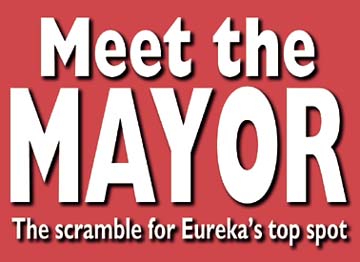
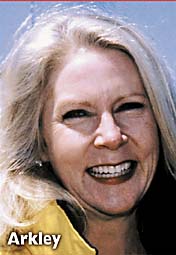 Cherie Arkley
Cherie Arkley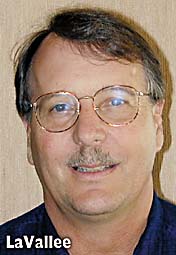 Peter LaVallee
Peter LaVallee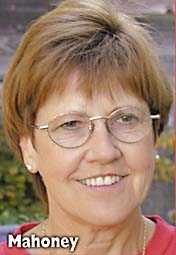 Mary Mahoney
Mary Mahoney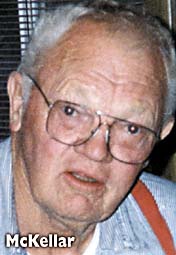 Jack McKellar
Jack McKellar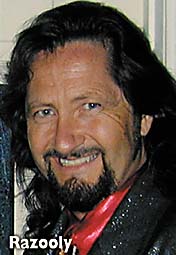 T. Great Razooly
T. Great Razooly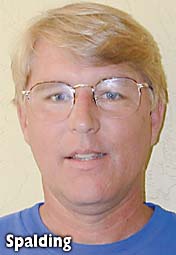 Marshall Spalding
Marshall Spalding